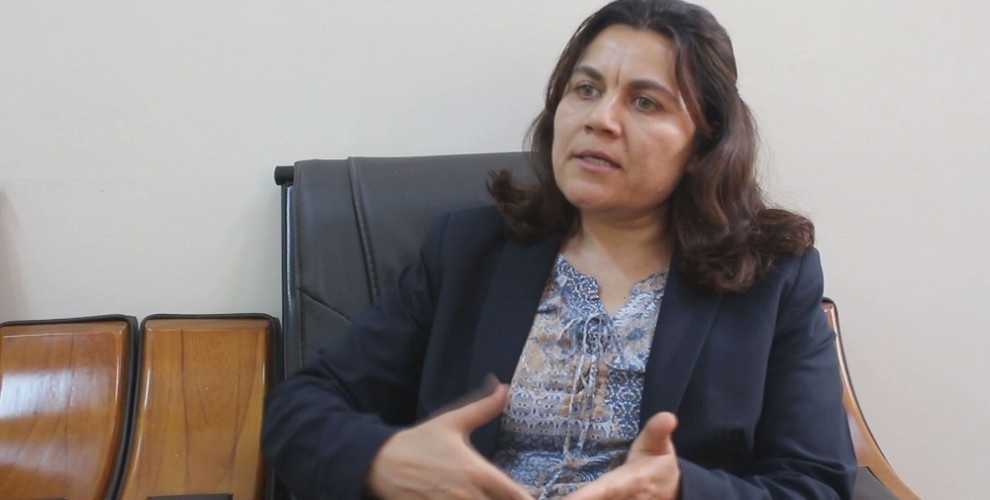Yusif: Turkey's dream is to revive the Ottoman Empire
Democratic Federation of Northern Syria Executive Council Co-chair assessed the current situation and Turkey's dream of reviving the Ottoman era.
Democratic Federation of Northern Syria Executive Council Co-chair assessed the current situation and Turkey's dream of reviving the Ottoman era.

Democratic Federation of Northern Syria Executive Council Co-chair Foza Yusif spoke to ANHA about the Lausanne Treaty, Turkey and Kurdistan.
What were the terms and conditions in the region that led to the Lausanne Treaty?
The Ottoman Empire witnessed a political, social and economic collapse before the Treaty of Lausanne and was described as a "sick man". After the defeat of the Ottoman Empire and its allies in the First World War, the winners of the war tried to impose their own conditions on the Ottoman Empire. First the region was separated through the Treaty of Sevres and then through the Treaty of Lausanne. The Treaty of Sevres, in which the right to independence was granted to all peoples, was not accepted by the Ottoman Empire.
After the agreement, Mustafa Kemal Ataturk, who wanted to regain the lands they had lost with the so called "Liberation War", convinced the Kurds to join him. Thanks to the participation of the Kurds, many places were retaken. As a result of that, international states had to sign the Treaty of Lausanne in order to avoid Kurds and Turks reclaiming lands. Again, the fear of an agreement between Ataturk and the Soviets opened the way to the new deal.
The Treaty of Sevres was thus canceled, and the Lausanne Treaty was signed instead, on 23 July 1923. In this deal nothing was said about the rights of the Kurdish people. It spoke only about the protection of Turkey’s peoples, regardless of their nations, cultures and genders. None of the promises made to Kurds have been kept and the denial policies against the Kurdish people, which have survived to this day, began.
How do you evaluate the outcome of the Treaty?
I think the Treaty was a disaster for Turkey as well. Because since that day peace in Turkey was never achieved and the country has become a country of military coups. The concept of Republic only remained on paper and the idea of the nation-state began to prevail in Turkey. Along with the nation-state, a denial of all identities in the region and assimilation policies began. However, disagreements between the people and the state began also to arise. Kurds, Alevis, Syriacs and Turks who were not pro-state were massacred for 95 years. A history of massacres against peoples began in Turkey where peace was never achieved.
How did the Lausanne Treaty affect Kurdistan?
This agreement was aimed at keeping the Kurdish people out of the political map. In other words, we can say that this agreement Turkey and Britain aimed at defining the border between Iraq and Turkey, of course dividing Kurdistan. There was no political framework, rather it was a liquidation agreement. Russia and Britain agreed to liquidate Kurdish people in agreement with the states that occupied Kurdistan. Turkey and Britain, also with the support of the Iranian Shah, liquidated movements such as Simko.
Today, in the four parts of Kurdistan where the Treaty of Lausanne remains in place, a new war is being waged to further divide and share. As people, we must analyze the future well in order to avoid experiencing the same tragedies again. If we take the targeting of people in Northern Kurdistan as the targeting of a single political party alone, we will be mistaken. Likewise, it should be seen that the elimination attack against Southern Kurdistan is aimed at not a single party but all Kurdish people. Targeting one part is the policy leading to the liquidation of the other parts.
A proper strategy is needed to overcome the effects of the Lausanne Treaty. The democratic nation project against the nation-state poison is the best medicine. The Treaty of Lausanne opened the way for the nation-state mindset and pushed people in great anguish. We need a new system in which our people are saved from enemies and the identity of the enemy is actually turned into a peace identity. A democratic nation or a decentralized democratic system will save people from massacres. Turkey's policy towards Iraq and Syria is aimed at reviving the National Pact.
Can we say Turkey today is trying to reclaim the lands it lost at the time of the Treaty of Lausanne? How should the Kurdish people act against these agreements?
Turkey’s only dream is to revive the Ottoman Empire and occupy the National Pact borders. However, the international conditions prevent Turkey from reaching its goal. This does not mean that Turkey will give up its dreams. The attacks on Syria and Iraq show that Turkey continues to pursue these dreams.
In order for the Kurdish people to be able to overcome these new deals and attacks, national values and achievements must first be seen as superior to anything else. Again, the Kurdish people should act in unity to guarantee their achievements.
Again, community action should be taken in order to prioritize the common life against the attacks aimed at the future of our society.